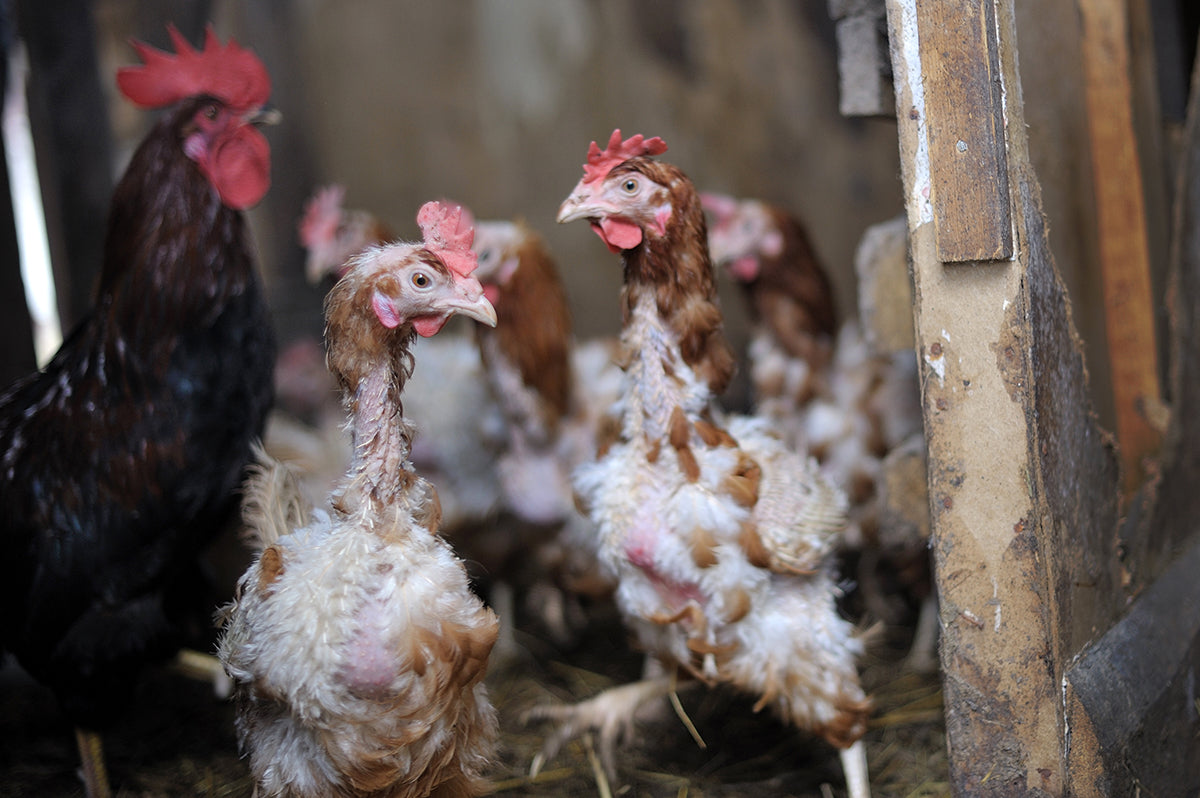
Why are my chickens losing feathers?
A handful of loose feathers on the floor of your coop is simply par for the course, but when you notice a lot of feathers around or even begin to see balding spots on your hens, you may naturally start to wonder what's going on. Is this normal? Why are my chickens losing feathers?

Feather loss can be normal for chickens. On the other hand, it can also indicate an underlying health concern or even an issue with flock dynamics. In any event, feather loss is not a situation to ignore. You want to understand what's happening so you can make adjustments as necessary.
Reason 1: Molting Season
The most common reason a chicken loses its feathers is because of the molting season, when chickens naturally release and regrow their feathers. Your chickens' bodies and biological functions respond greatly to the length of daylight. As fall approaches and the total hours of daylight decrease, your chickens begin to lay fewer eggs. This is a direct biological response to less daylight, and some chicken keepers begin to use supplemental lighting in the coop to try to extend the laying season.
The same process is at play with molting. When summer daylight hours begin to dwindle in the fall (or into winter in the South), it's a biological trigger for chickens to start molting. Spent, worn-out feathers begin to release — first around your chickens' heads and necks, then progressing down their bodies. After this process, fresh feathers grow, and the chickens look great again, ready to get through another winter and the happy summer beyond.
This is truly an amazing biological tool because it allows your chickens to grow fresh feathers when they're needed to combat the coming chill of winter. You can help your chickens stay comfortable during cold weather with a heated perch to help keep their bare toes warm or a chicken-safe heated pad placed horizontally or vertically in the coop for them to warm their bodies with. If you have chicks or smaller chicken breeds in your flock, you can try a smaller “peep-sized" heated pad.
Occasionally a chicken will molt at a different time of year, perhaps triggered by some kind of change in routine. But generally, if your chickens are older than 18 months, healthy, and it's getting close to fall, feather loss is most likely a result of the natural molting process.
Reason 2: Inadequate Nutrition
Chicken feathers are made basically of protein. And it takes a lot of energy to build and maintain feathers. So if your chickens' nutritional needs aren't being met, it could lead to some feather loss. Check with a local university extension or a farm animal veterinarian who works with poultry to help you determine the nutritional needs of your chickens' breed and climate.
Additionally, a constant supply of clean, fresh water is critical to the health of all livestock. In cooler weather, your chickens might be less inclined to drink chilly water, but you can keep them supplied with water in winter when you use a poultry waterer combined with an appropriate deicer.
Reason 3: Brooding
If one of your hens gets into a “broody" mood — when she's either thinking about or actively incubating eggs — she may have an instinct to pull feathers off her body in an effort to keep the eggs warmer. This tendency can be genetic, with heavy-laying breeds becoming broody more often. You can try to limit the behavior by removing any eggs from the nestboxes and getting her outdoors more often, but it's just something to wait through.
Reason 4: Fighting
Chickens sometimes have a tendency to argue, fight, or literally pick at each other, which can lead to feather loss. This isn't a good situation, and it's one you want to remedy immediately or, ideally, prevent from ever happening in the first place.
You can help achieve harmony by making sure all your hens have enough room — at least 2 square feet per bird (and ideally more) of floor space in the coop, along with plenty of room for everyone to use the feeders, waterers, and other coop amenities. This can go a long way towards keeping the “pecking order" calm and quiet. In a similar fashion, some chickens may pull their own feathers out of sheer boredom. Offering fresh treats, a few toys, a dust bathing area, and time in the run can all help.
Reason 5: Parasites
Additionally, it could be a health issue, particularly with chicken parasites like mites or fleas. In this case, providing a dust bathing area can be important. Some chicken keepers add food-grade diatomaceous earth (DE) to the dust to help damage the parasites' exoskeletons and get rid of them (although the effectiveness of this solution is up for debate). A multi-pronged approach is best regardless of how you choose to deal with parasites. Keep the coop extra clean and be careful about introducing new members of the flock that might bring parasites along for the ride.
Don't Ignore Feather Loss
Chickens lose their feathers for a variety of reasons, and it's definitely worth investigating why. Most likely, it's something benign like a normal molting process, and your chickens will have fresh new feathers before you know it. But if you discover a different issue, you'll be able to solve it before the issue escalates.




